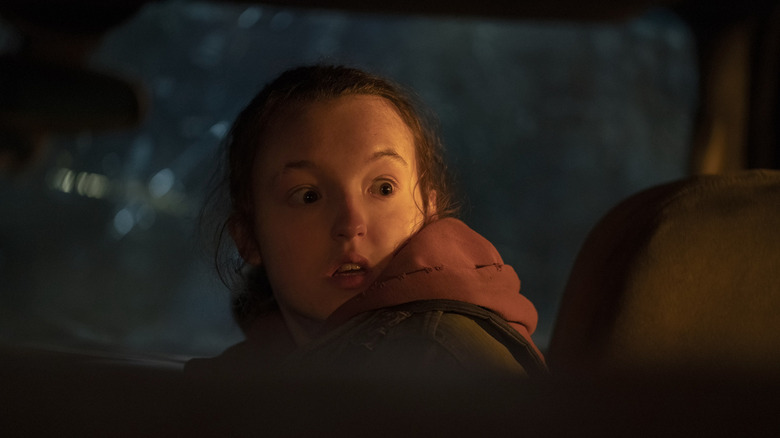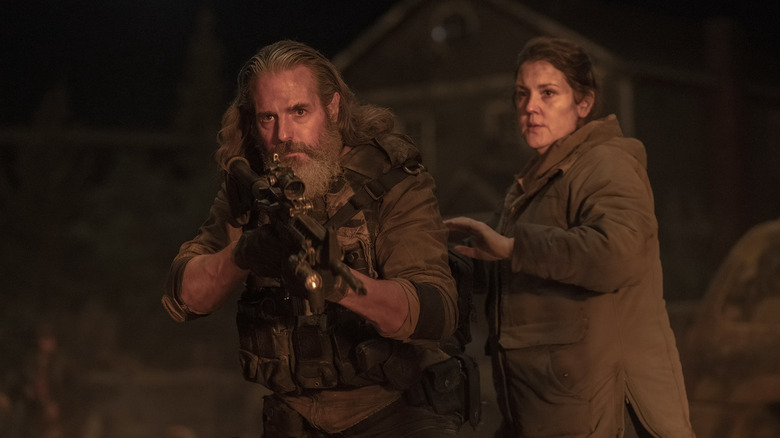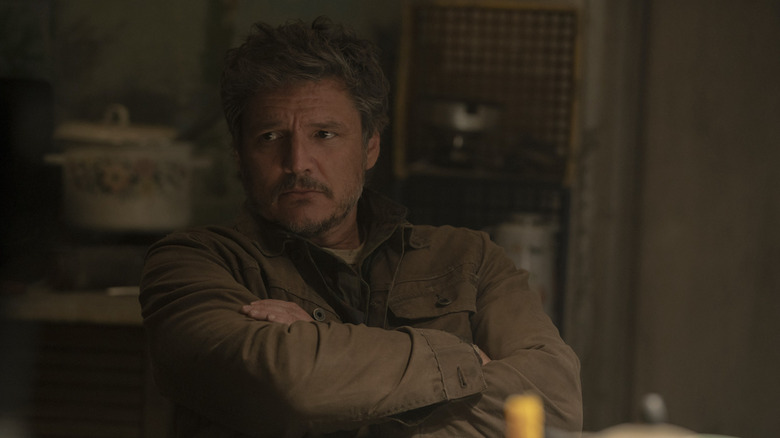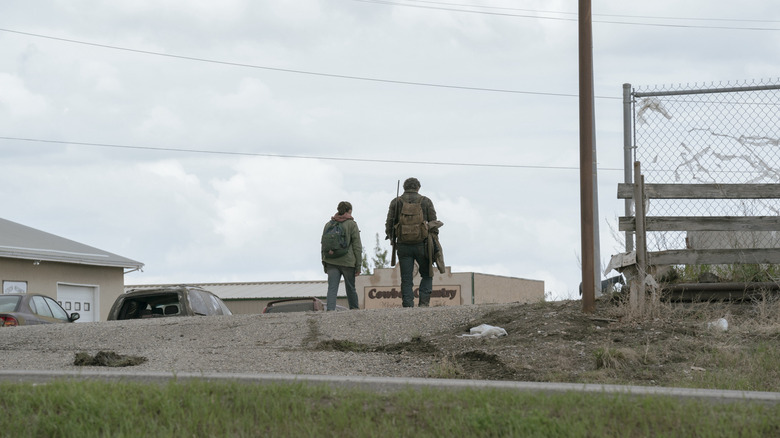Why The Last Of Us Made A Tragic Change To The Sniper Sequence From The Game
This post contains spoilers for "Endure and Survive," the fifth episode of "The Last of Us."
"The Last of Us" is an extremely cinematic video game, but it's still a video game. Some playable scenes from the Naughty Dog Playstation game would never translate to screen, while some scenes from the HBO adaptation wouldn't work in a video game. As always, series co-creators Neil Druckmann and Craig Mazin attempted to strike the right balance, giving people who played the games everything they came for from the series, while adding characters, plots, and moments that elevate scenes that otherwise would've fallen flat without a controller in one's hands.
This week on the official "The Last of Us" podcast, the two spoke with host and game voice actor Troy Baker about adapting the big Kansas City face-off (which took place in Pittsburgh in the game), and explained how they were able to take one un-adaptable game detail and turn it into a surprisingly heartbreaking showdown. In the game version of "The Last of Us," Joel encounters a sniper who taunts him from within a house. As the player, you have to exchange gunfire with him and other snipers, but it's not a sequence that would translate well on screen.
"In the game, the sniper is really good, and he's not alone," Mazin told the podcast. "There are six or seven other guys with him that you have to clear out." The filmmakers describe an action scene in which Joel has to duck around the perimeter of nearby houses in order to avoid the sniper, before ultimately making his way to the sharpshooter. "The way we wrote that sniper was that he would antagonize you," Druckmann says. "He yells at you to kind of rile you up to make you angry. So when you get in that house, you unleash on him."
The sniper scene was totally reinvented for the show
It's a great bit of gameplay, but it's also one of those sequences that can become both exhausting and hilarious if you push one wrong button. By the time players are face to face with the sniper who won't shut up, we're happy to shoot him, which is pretty antithetical to the feeling the HBO series wants to convey about the weight of taking a life. Plus, as Mazin pointed out, "we weren't going to get the same value from presenting the action the way that the gameplay did." There's not much for viewers to get out of watching "a lot of ducking and shooting back" between two characters.
Instead, the show gives viewers a quick but impactful scene in which Joel opens the door to the shooter, only to discover that he's actually elderly. The man, who is credited as actor Ron J. Anderson in the episode, gives Joel a look that indicates he's ready to die for the cause. Joel doesn't want that, and offers him an out: hand over the gun and stay put for an hour before fleeing, and no one will be the wiser. The man silently makes the decision not to do that. We see him turn to Joel, as determined as he is feeble, and hear the gunshot that marks the end of his life as the camera cuts away.
The elderly man gives the scene emotional weight
Mazin explains that the pair basically reverse engineered the backstory for the new version of the sniper, first deciding that the shootout wouldn't work, then realizing it could make way for a more interesting story if the sniper was actually bad at shooting for a reason Joel couldn't know until he meets him face to face. "So, then the thought was, 'Well, what if he stinks? What if this sniper is really bad, and all Joel has to do is just get around and get in there?'" Mazin said the podcast. "And then the next question is, 'Well, why is he bad?' And the answer is, he's really old. He can't see."
The pair settled on the idea that the sniper was an aging man who was part of the non-military group that overthrew Kansas City. "This is sad because when you are dealing with the citizen brigade, this is often what you're dealing with," Mazin shares. "It's not trained military soldiers, these are people. And this guy, one can imagine, has seen a lot." Mazin reasons that if the sniper in question was around 80 years old, "That means 60 years of his life, he was living in a perfectly normal world." There's a grief to the character, then, who wasn't built for a post-apocalyptic world but was asked to take part in it nonetheless.
'This guy doesn't want to be here anymore'
Enter Joel, who has a knack for seeing the worst in everyone, especially when it comes to hidden sadness and pain that might match his own. "When Joel walks in there, I think Joel can already see it in the guy's eyes," Mazin said. "He's going to commit suicide by cop here. This guy doesn't want to be here anymore." The actor described Joel as "begging him not to" because as much as the man doesn't want to be there anymore, Joel doesn't want to be the one to put him down. On screen, we see decades of pain and exhaustion communicated between the two in just a few seconds' time.
As if all of that isn't dark enough, Druckmann also points out the way it ties back into one of Joel's most upsetting lines from the game. He recalls a scene when Ellie says a person who committed suicide took the easy way out, to which Joel replies, "It's not easy." According to Druckmann, Joel can sense that type of pain. "The thing that Craig was just talking about, Joel recognizes that," he said, "and that's why he sees it immediately in this man." Leave it to "The Last of Us" creators to take one of the few moments in the game that has some chaotic fun to it and reinvent it as the saddest thing we've ever heard. We wouldn't have it any other way.
If you or anyone you know is having suicidal thoughts, please call the National Suicide Prevention Lifeline by dialing 988 or by calling 1-800-273-TALK (8255).



